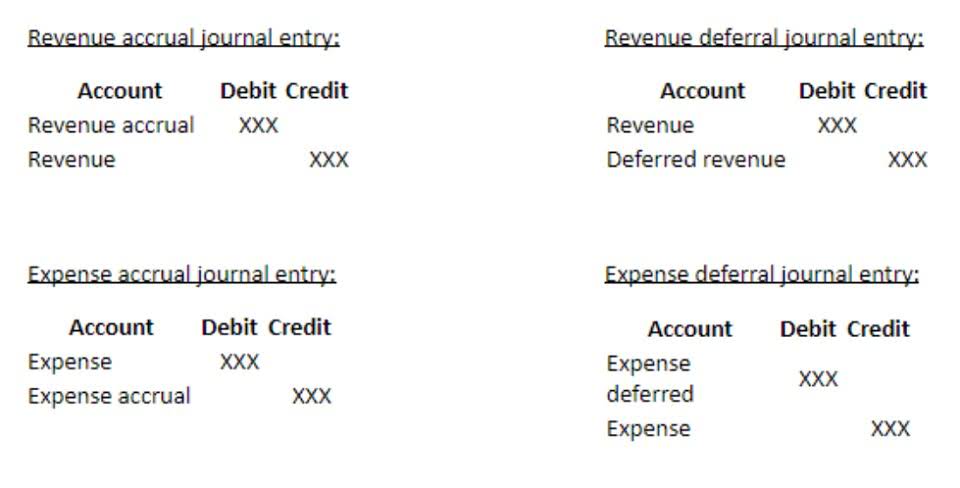Accrual and Deferral in Accounting: Business Guide for 2025

The choice between accrual and deferral accounting affects not only the immediate financial statements but also long-term business strategies, budgeting, and forecasting. Understanding these methods is essential for stakeholders who rely on accurate financial information to make informed decisions. This entry reflects the increase in cash and the corresponding liability for unearned revenue. As services are provided each month, a portion of the deferred revenue will be recognized as revenue. This knowledge is crucial for stakeholders to assess a company’s financial health accurately since it provides a clearer picture by matching revenues with their corresponding expenses.

Expense recognition principle
- Deferred expenses or prepaid expenses are expenses that the business has paid for but the business has not yet been compensated for.
- Accrual accounting recognizes revenue and expenses as they are earned or incurred, regardless of cash flow timing.
- The point where an adjusting entry becomes necessary is when an Expense is incurred, but the company has not been billed yet.
- Deferred expenses are costs that have been paid but not yet incurred on account.
- Wages Payable served as the account to cross over from one accounting period to the next.
- In contrast, accrual accounting recognizes revenues and expenses when they are earned or incurred, regardless of when cash changes hands.
A deferral system aims to decrease the debit account and credit the revenue account. Accruals are when payment happens after a good or service is delivered, whereas deferrals are when payment happens before a good or service is delivered. An accrual will pull a current transaction into the current accounting period, but a deferral will push a transaction into the following period. Grouch receives a $3,000 advance payment from a customer for services that have not yet been performed. Its accountant records a deferral to push recognition of this amount into a future period, when it will have provided the corresponding services. Since accrued revenue is earned and can be reasonably estimated by a business, it is considered a certain income.
Cash Management

If the company completes a project in December but does not receive payment until January, it real estate cash flow would record the revenue in December under the accrual method. This statistic underscores the importance of adopting accrual accounting for businesses aiming to present a true and fair view of their financial performance. For instance, a service that should be provided for six months may be paid in full in the first month. In this case, the lump sum payment is spread over the fiscal period by recording it a deferred revenue account.

Examples of Deferrals Illustrated

By analyzing trends in revenues and expenses as they are recognized, rather than when cash is exchanged, companies can predict future financial positions with greater accuracy. This is particularly useful for long-term forecasting, where the timing of cash flows may be less indicative of a company’s ongoing financial health than the recognition of revenues and expenses. Deferral accounting’s impact on forecasting is also significant, as it requires companies to consider the timing of revenue recognition and expense matching.
- Accrual accounting recognizes revenues and expenses when they are earned or incurred, regardless of when cash is exchanged.
- Accruals for revenue recognition methods give you the power to paint an accurate picture of your business’s financial success while maintaining control over how revenues are recognized.
- Choosing between accrual and deferral accounting depends on various factors, including the nature of the business, regulatory requirements, and the need for accuracy in financial reporting.
- In conclusion, understanding the impact of deferrals on financial statements is crucial for accurate reporting.
- Accruals are adjustments made to recognize revenue or expenses that have been earned or incurred but have not yet been recorded.
The purpose of Accruals is to allow the recording of revenues earned but no cash received (Accounts Receivable) and the recording of expenses incurred but no cash paid out (Accounts Payable). Accruals record revenue in the month earned and expenses in the month incurred, regardless of payment status. Accruals mean the cash comes after the earning of the revenue or the incurring of the expense. Accruals and deferrals help provide a clearer perspective on a company’s financial performance, but the accrual method relies on the efficiency of your financial management and accounting practices. Using accrual and deferral accounting, businesses can more clearly see how they generate revenue and manage expenses during each accounting period. Robust financial reporting and expense management are crucial for all businesses, but they’re especially vital for small businesses and startups.
- Accrual accounting tends to provide a more accurate representation of a company’s financial position by matching revenues and expenses within the same period.
- Understanding accruals and deferrals is crucial for businesses that desire control over their financial statements.
- BrieflyFinance is built based on my passion to continuously learn and find ways to simplify content for you on key topics about finance and cryptocurrencies.
- This allows for better decision making as it provides a more realistic representation of a company’s financial health.
- Accrual accounting focuses on recognizing revenue and expenses when they are earned or incurred, regardless of cash movements.
- Choosing between accrual vs deferral accounting depends on your specific circumstances.
Streamline your deferred revenue processes with Mural’s Bill Pay service to ensure effective cash flow management. If you see deferred revenue in the liabilities side of the balance sheet it means that the company received money in advance and should deliver a product or a service for it. Understanding the differences between accrual and deferral is essential for accurate financial reporting. For example, the revenue accrues in December if you provide services in December, even if you won’t receive payment until January. If you receive payment for a service to be provided in the future, that’s recorded as deferred revenue until the accrual vs deferral accounting service is completed. Using these strategies regularly helps someone looking at a balance sheet comprehend an organization’s financial health during the accounting period.
It’s one element of the broader matching principle, Certified Public Accountant a fundamental GAAP accounting requirement. In simple terms, it states that you should recognize any revenue earned as a direct outcome of a business expense in the same period as the expense. Yes, accruals and deferrals affect taxes by influencing when income and expenses are recognized, impacting taxable income.

Accounting Recognition
Deferrals are a type of adjusting entry and are important in order to adhere to the matching principle of accounting. These journal entries ensure that revenue and expenses are reflected on financial statements in the same accounting period as the delivery of goods and services. This helps businesses adhere to the accrual basis of accounting under which transactions should be recorded when revenue and expenses are earned and incurred rather than when cash is exchanged for goods. In summary, accrual and deferral accounting are two fundamental methods used to recognize revenue and expenses in financial statements. According to the accounting standards, public companies need to follow the accrual method of accounting.